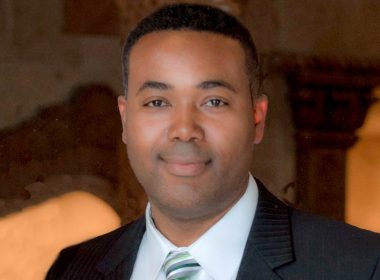
There has been no greater omission from our historical past than the name of Paul Robeson, who has been seemingly written out of American history as an African American icon reserved for the likes of Malcolm X, Martin Luther King Jr, Harriet Tubman, Adam Clayton Powell Jr., Frederick Douglass, Sidney Poitier, Muhammad Ali, Marian Anderson and others in various fields of excellence as the least known figure in our history. America’s deletion of Robeson in this country’s history shows the power of the United States government’s ability to erase an individual from our national consciousness. Robeson was scorned in his own country, yet beloved as a global superstar and perhaps the greatest American Renaissance man of the 20th century as an athlete, scholar, lawyer, singer, activist, film director, actor, orator, musicologist, labor force supporter, concert singer, historian and global citizen.
Born on April 9, 1898, in Princeton, N.J., as the youngest of three brothers Reeve, William Drew Jr, Benjamin and sister Marian to his parents Rev. William Drew Robeson, a former escaped slave, and Maria Louisa Robeson, who would die tragically in a house fire when Paul was 6 years old.
After high school Paul earned a scholarship to Rutgers University in New Jersey, one of three blacks in school’s history, where he would become an honor student, a two time All-American football star, play basketball, baseball and run track. At Rutgers, he was an academic genius graduating Phi Beta Kappa and becoming Valedictorian of his graduating class at school where he was affectionately called “Robeson of Rutgers.” After graduating from Rutgers, he would attend the prestigious Columbia Law School where he would become the third black graduate in that institution’s history. Paul married Eslanda Goode after meeting in New York, who would bear him a son named Paul Robeson Jr. After becoming disenchanted with the law field in New York because of the racism he encountered and encouraged by Essie, he decided leave the law practice to use his talents as a singer and actor soon to become the most significant Black actor in America on stage and the silver screen. Paul was the first black actor who rose to international prominence in film, bringing dignity and respect to Black characters. He was the actor who gave the memorable performance and profound interpretation of Shakespeare’s Othello in modern times. Paul became one of America’s greatest concert and interpretive artists and the first, along with Roland Hayes, to raise Black spirituals to their rightful place of dignity in the best concert halls throughout in the world. He was an accomplished musicologist and symbol of excellence on the American stage scene. Paul also used his singing talents as an activist and spokesman for the Black, poor and oppressed in America and throughout the world becoming an inspiration to the American Labor Movement.

Paul Robeson was a brilliant scholar of language and world culture, recognized by some of the world’s most respected historians; he also studied, spoke and wrote more than 20 languages, including many African languages, Chinese, Russian and Arabic as a linguist. He would be embraced as a global icon wherever he went, but his support of liberation movements in Africa in the 30s and 40s, friendship with Soviet Premier Nikita Khrushchev and the Russian people would cause his persecution in the U.S. during the “Cold War” era.
In the 1950s, the entire country was swept up in the anti-Communist hysteria led by U.S. Senator Joseph McCarthy of Wisconsin, figurehead of McCarthyism, who wanted to identify individuals with Communist ties and Paul became an easy target for his outspoken ideas. He was prevented from working abroad with his passport being held for 8 years which would curtail a brilliant career at that point. Paul testified before an Anti-Communism Committee for Un-American activities where he told them in essence, that whatever party he belonged to and who his global friends were was nobody’s business but his own. Even black baseball pioneer Jackie Robinson testified against Paul due to some statements made by Robeson in Paris and very few black celebrities stood by him at this time except Lena Horne and a handful of supporters.
Though he became a victim of McCarthyism and his own integrity, he incredibly survived when that era ended to resume his career as an artist in America and abroad. Old age, illness and the death of his beloved Essie in 1965 finally dictated his retirement from public life after more than four decades in the spotlight. He died in Philadelphia where he lived with his sister Marian on January 23, 1976 at the age of 77 as virtually a recluse with little public acknowledgement of his great accomplishments. Paul Robeson should always remembered for his activism for his people and the poor working class people around the world along with his brilliant stage career, his being a global goodwill ambassador, singer, film director, actor in great films like the classic Emperor Jones, King Solomon’s Mines, The Song of Freedom, Sanders of the River, The Proud Valley and many other films. The Paul Robeson story should indeed be a part of school curriculums in elementary schools, high schools and colleges throughout the country. As a people, we need to rediscover this great man and not allow his memory to be lost in history –malik ismail
Malik Ismail is an international traveler, historian and activist. He’s explored many cultures in Africa including Ghana, South Africa and Egypt. He’s traveled to Cuba and South America. Recently he visited Rio de Janeiro and Salvador Bahia, Brazil including the favelas of Rocinha and Cidade de Deus (City of God) in Rio. His writings have been featured in the L.A. Watt’s Times, It’s About Time BPP Newsletter, rolling out Magazine and The Black Panther Intercommunal News Service. Email: [email protected]











